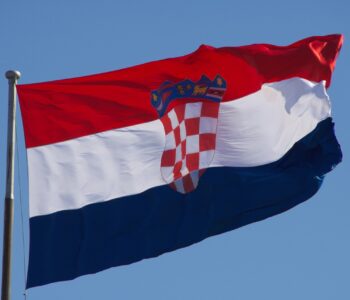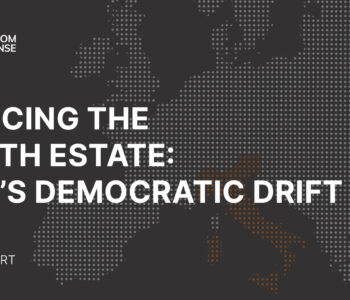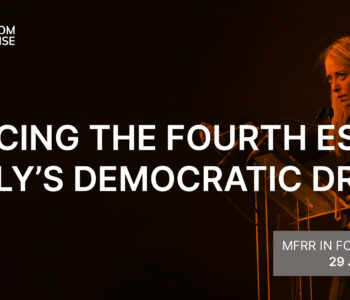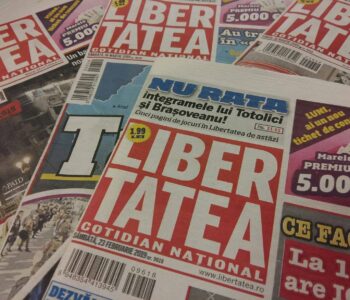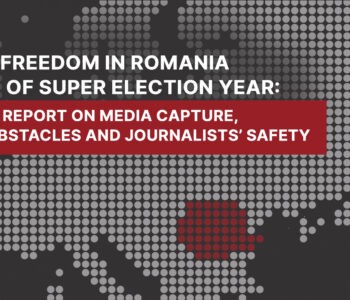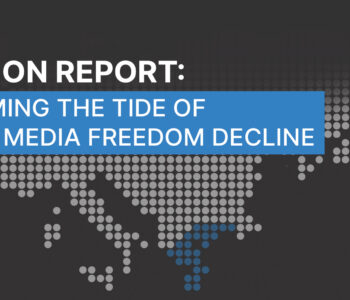La coalizione per la libertà dei media lancia l’allarme su interferenze politiche e minacce legali che colpiscono il giornalismo italiano
In vista delle prossime elezioni europee, il Media Freedom Rapid Response (MFRR) è stato spinto a organizzare una missione di advocacy urgente in Italia il 16-17 maggio per affrontare alcuni sviluppi preoccupanti relativi alla libertà di stampa e dei media. Tra le questioni affrontate dal consorzio europeo figurano interferenze politiche senza precedenti nei media del servizio pubblico, minacce legali da parte di membri del governo nei confronti di giornalisti critici del potere, e la possibile acquisizione dell’agenzia di stampa AGI da parte del deputato Antonio Angelucci.
L’attuale stato della libertà dei media in Italia solleva numerosi timori. La preoccupante tendenza alle ingerenze politiche e alle molestie legali mina i principi democratici e minaccia l’indipendenza e il pluralismo essenziali per una stampa libera.
Durante la visita a Roma, la delegazione MFRR ha incontrato funzionari di diversi organi istituzionali, tra cui:
- La senatrice Barbara Floridia, Presidente della Commissione parlamentare per l’indirizzo generale e la vigilanza dei servizi radiotelevisivi;
- La senatrice Ilaria Cucchi, Vicepresidente della Commissione Giustizia del Senato della Repubblica;
- Giacomo Lasorella, Presidente dell’Autorità per le Garanzie nelle Comunicazioni (AGCOM) insieme ai membri del consiglio AGCOM;
- La Deputata Valentina Grippo, membro della delegazione italiana all’Assemblea parlamentare del Consiglio d’Europa;
- Il dottor Pierluigi Mazzella, Rappresentante del governo italiano presso il Comitato Direttivo sui Media e la Società dell’Informazione (CDMSI) del Consiglio d’Europa;
- Membri della Rappresentanza Permanente in Italia della Commissione Europea.
La delegazione MFRR ha incontrato diversi giornalisti di varie testate, sindacati e rappresentanti di organizzazioni della società civile per analizzare la situazione della libertà dei media nel paese, prendendo parte al sit-in dedicato alla libertà di stampa davanti alla sede della RAI ed organizzato dall’Unione Sindacale Giornalisti Rai (USiGRai).
Con grande rammarico, la missione non ha avuto l’opportunità di incontrare nessun esponente della coalizione di governo, poiché tutte le richieste di incontro sono state rifiutate o ignorate.
Ingerenze politiche nei media pubblici
La Radiotelevisione Italiana (RAI), il servizio pubblico radiotelevisivo italiano, è attualmente soggetta a un grado di ingerenza politica senza precedenti che rischia di portare ad un completo controllo da parte del governo in carica. Sebbene una certa politicizzazione del servizio pubblico non sia un fenomeno nuovo, le discussioni con alcuni giornalisti della RAI hanno confermato un livello di pressione e autocensura senza precedenti.
La delegazione ha accolto con favore l’iniziativa della senatrice Barbara Floridia di promuovere una convenzione nazionale (“Stati Generali”) composta da tutti i partiti politici, esperti mediatici indipendenti e altri stakeholder, volta a riformare la governance e il finanziamento dei media pubblici in linea con lo il Regolamento europeo sulla libertà dei media.
Mancata depenalizzazione della diffamazione e riforma delle disposizioni del codice civile sulla diffamazione
I giornalisti, in particolare quelli investigativi che denunciano illeciti da parte di politici e pubblicano informazioni di interesse pubblico, devono fronteggiare un numero crescente di azioni temerarie spesso avviate da membri dell’attuale governo, compresa la Presidente del Consiglio, Giorgia Meloni.
Invece di aderire alla tendenza europea diretta alla depenalizzazione della diffamazione, di procedere con una riforma del codice civile, e di iniziare a recepire la direttiva anti-SLAPP dell’UE, il governo italiano sceglie di andare nella direzione opposta. Il DDL Balboni, proposto dalla coalizione di governo per riformare la diffamazione, non solo non depenalizza la diffamazione e non avvia una riforma completa nell’ambito del diritto civile: se approvato, le disposizioni del DDL Balboni rischiano di comprimere ulteriormente lo spazio dell’indipendenza editoriale e di esercitare un grave effetto inibitorio sulla comunità giornalistica.
Possibile acquisizione dell’agenzia di stampa AGI
La possibile acquisizione di AGI (Agenzia Giornalistica Italiana), da parte del deputato Antonio Angelucci – già proprietario di diversi importanti quotidiani – pone un serio rischio per l’indipendenza editoriale di una delle principali agenzie di stampa del paese.
Se si concretizzasse, l’acquisizione sarebbe in contrasto con l’articolo 6 del Regolamento europeo sulla libertà dei media, il quale stabilisce che i responsabili editoriali devono essere liberi di prendere decisioni senza interferenze e che chiunque abbia interessi in fornitori di servizi di media deve dichiarare eventuali conflitti di interesse. Tale acquisizione potrebbe inoltre creare un pericoloso precedente che rischierebbe di impattare altre agenzie di stampa nel paese e rappresenterebbe un ulteriore peggioramento dell’annoso problema della concentrazione dei media in Italia.
Raccomandazioni
- Invitiamo il Parlamento italiano, affiancato da esperti indipendenti, dalle associazioni di categoria, tra cui la Federazione Nazionale della Stampa Italiana (FNSI) e l’Ordine dei Giornalisti (OdG), in collaborazione con con l’Unione Europea di Radiodiffusione (EBU) ad avviare una riforma completa della legislazione che regola i servizi radiotelevisivi pubblici italiani in linea con l’articolo 5 del Regolamento europeo sulla libertà dei media;
- Esortiamo il Parlamento italiano a implementare una riforma completa delle leggi sulla diffamazione, in linea con gli standard UE e internazionali sulla libertà di espressione;
- Se si concretizzasse una proposta di acquisizione dell’agenzia di stampa AGI, i regolatori AGCOM e AGCM (Autorità Garante della Concorrenza e del Mercato) dovrebbero condurre una valutazione approfondita e trasparente diretta a considerare l’impatto sul pluralismo dei media, l’indipendenza editoriale e il conflitto di interessi, in conformità con il Regolamento europeo sulla libertà dei media.
Prossimi passi della rete MFRR
Nelle prossime settimane, il consorzio MFRR, in collaborazione con i partner locali, continuerà a monitorare gli sviluppi nel paese e rinnoverà la richiesta di incontro online con i rappresentanti della coalizione di governo italiana. I risultati della missione saranno presentati nei prossimi mesi in un rapporto accompagnato da una serie di raccomandazioni rivolte al governo italiano e alla Commissione Europea. Gli esperti del consorzio sono inoltre pronti a mettere a disposizione la propria competenza per promuovere l’indipendenza dei media pubblici e la libertà di stampa in Italia.
La delegazione MFRR era composta da rappresentanti di ARTICLE 19 Europe, dell’European Centre for Press and Media Freedom (ECPMF), della European Federation of Journalists (EFJ), dell’International Press Institute (IPI) e di OBC Transeuropa (OBCT).
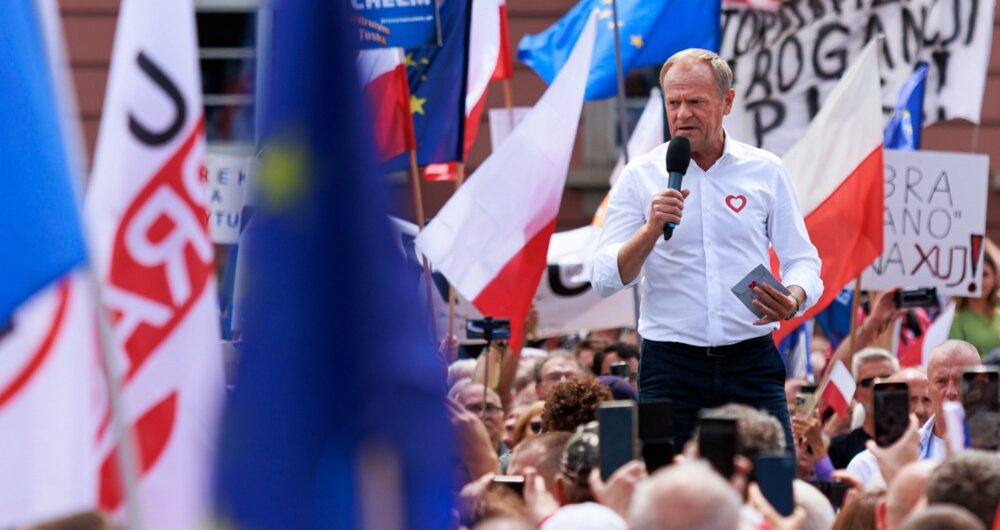 Library
Library

